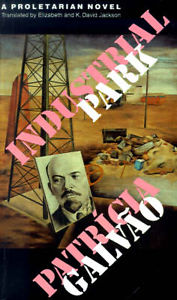You have no items in your cart. Want to get some nice things?
Go shopping
Richard Lehan argues that “each crowd offers a way of reading the city”. Patrícia Galvão’s (communist) novel Parque Industrial: Romance Proletário (Industrial Park: A Proletarian Novel), published in 1933, is a good example of this. Indeed, this book—or collection of cubist montage chapters—has many characters but does not develop them much individually, which gives the impression that the group is the novel’s main character. What matters in Industrial Park is not each character’s individuality per se, but how each of these is part of a jigsaw that forms the bigger picture of 1920s São Paulo. The novel’s collection of snapshots thus offers the reader views of São Paulo’s geographical spaces of segregation, particularly the Brás district, where relations between the dominant and the working classes, the powerful and powerless, men and women take place. As Mary L. Daniel points out, Industrial Park is a strong documentation (in Brazilian fiction) of the struggles that the proletariat in general—as well as females who worked in factories—faced, particularly during the 1920s.
Galvão writes a book that is not only aesthetically different—although some researchers claim that she had no literary ambition with the novel—but also engages with social problems; an issue that was not a preoccupation for the first generation of modernist literature writers with whom she was engaged. Moreover, although much Brazilian literature of the 1930s—the so-called regionalist literature—dealt with the working class’s struggle (mostly in the rural northeast), Galvão’s Industrial Park focuses on an urban space which is “the greatest industrial centre of South America,” as she writes in the opening of the book. The author offers snapshots of the many issues that industrialisation brought to the city and its working class, which was also constituted of many immigrants, especially from Europe. These immigrants were exploited as a labour force but were, at the same time, disseminating ideas to fight against poor working conditions, which is evident in some of her female characters’ attempts to mobilise the masses. Galvão portrays the misery of the working class and the rampant exploitation they suffered. Furthermore, she touches on the gender politics of that time, illustrated in the novel by many women being sexually abused and treated like whores.
 In her short but intense life, Patrícia Galvão, or simply Pagu, (1910-1962), left her mark on Brazilian culture, but little recognition has been given to her. In many of the country’s literature anthologies no reference is made to this controversial figure of São Paulo in the last century, who was also described as “The girl with crazy hair…who abolished the grammar of life. She is the latest product from São Paulo…the shining announcement of Antropofagia.” Although Galvão produced little in terms of literature (she wrote extensively for newspapers), her writing is important yet still little known, not only abroad but also in Brazil. She was a rather controversial figure whose views on certain issues—such as abortion and marriage—were ahead of her time for that period in Brazil (if not for contemporary Brazil). She became involved with intellectuals who were part of the well-known movement Anthropophagy, which aimed to reconfigure Brazilian literature to create something national, rather than repeating imported aesthetics.
In her short but intense life, Patrícia Galvão, or simply Pagu, (1910-1962), left her mark on Brazilian culture, but little recognition has been given to her. In many of the country’s literature anthologies no reference is made to this controversial figure of São Paulo in the last century, who was also described as “The girl with crazy hair…who abolished the grammar of life. She is the latest product from São Paulo…the shining announcement of Antropofagia.” Although Galvão produced little in terms of literature (she wrote extensively for newspapers), her writing is important yet still little known, not only abroad but also in Brazil. She was a rather controversial figure whose views on certain issues—such as abortion and marriage—were ahead of her time for that period in Brazil (if not for contemporary Brazil). She became involved with intellectuals who were part of the well-known movement Anthropophagy, which aimed to reconfigure Brazilian literature to create something national, rather than repeating imported aesthetics.
One of these figures was Oswald de Andrade, with whom Pagu would have a short-lived marriage, and a son; but she left them in 1933 to travel abroad. She visited a few communist countries and was even deported from France for getting involved in street demonstrations. Because of Pagu’s political views and activism—for instance, she became a member of the Brazilian Communist Party in 1931—she ended up being arrested in Brazil and was sent to prison, where she stayed between 1935 and 1940: she was the first Brazilian woman to become a political prisoner. There are various other facts about Pagu’s life that could be mentioned here, but the ones offered so far suffice to show the controversies that this woman/writer/mother/wife represented to the patriarchal Brazilian society of her time in terms of gender and sexuality, particularly during Getúlio Vargas’s ‘government’ (1930-1945).
Because of Galvão’s ideas and behaviour she could be (and indeed has been) considered a feminist of her time. However, she was very critical of her contemporary feminists, who were mostly educated women who belonged to the upper class and had little connection with the social reality of the women who belonged to the exploited working class. This is evident throughout her novel, and is well illustrated in a passage in which a group of feminists is in a bar. One of them talks to a German waiter about their newly acquired rights to vote:
−The vote for women has been achieved! It’s a triumph!
−And women workers?
− They are illiterate. Excluded by nature.
Industrial Park is a very political novel and clearly shows the subversive character of its author. Galvão had to publish it under the pseudonym Mara Lobo after she fell out with the Communist Party because of her ideas. In the novel the author offers a sympathetic portrayal of working-class women while criticising the “vain” women from the dominant class (“the feminists that the bourgeoisie of São Paulo produces”). She shows how the working-class girls struggle and are exploited in the shameful work conditions of the factories in São Paulo of the 1920s. She demonstrates that women had such long shifts in these factories that they could hardly be proper mothers for their own children. As one of the characters says: “We can’t get to know our own children! We leave home at six in the morning. They are sleeping. We return at ten. They are sleeping.” She also criticises the differences between women according to their class: rich women go to the theatre and wear expensive clothes, while the poor are jammed in the factories and have to work (in poor conditions) “for five years to earn the price of a bourgeois dress”.
Many issues related to gender and sexuality appear throughout the novel, including abortion, infanticide, lesbianism and even group sex, which were sensitive subjects at that time, and still are. Besides these, virginity is a key issue in the book, which is a demand for a respectable girl in such a patriarchal society. Many of the women’s sexuality is latent, and at the same time it has to be contained because of the judgemental society. If they choose to enjoy their sexuality freely, they will not be able to get married, which is a way many of these women see of escaping from poverty and hard work in the factories (i.e., getting married to a rich man). But the book makes it clear that it is nearly impossible for them to marry outside their class, and further suggests that many of the females had little choice other than prostitution to improve their lives (if it did at all!). Hence, Industrial Park shows that gender and sexuality also become a source of class exploitation, which is well illustrated through sexual violence against working-class women, particularly violent rapes. The abuse that the dominant-class men inflict on the women they rape goes unpunished; as one male character says: “Since when did the police ever go after a politician’s son?”
Galvão’s novel is embedded in Marxist and Feminist ideologies and the combination of these exposes the oppression of class and gender (although class analysis has been mostly absent in many Feminist studies). They are not simply women, but working-class women. Gender and sexuality in Industrial Park become the mechanism through which class relations take place, inviting new readings of Galvão’s “proletarian (gendered) novel”.

About Antonio Marcio Da Silva
Dr Antonio M. da Silva is coordinator of Portuguese Studies at the University of Kent (UK) where he teaches the Portuguese language and cultural modules on cinema and literature from the Portuguese-speaking world. His research interests include representations of gender, sexuality, race, and social class in Afro-Luso-Brazilian cinema and literature.




